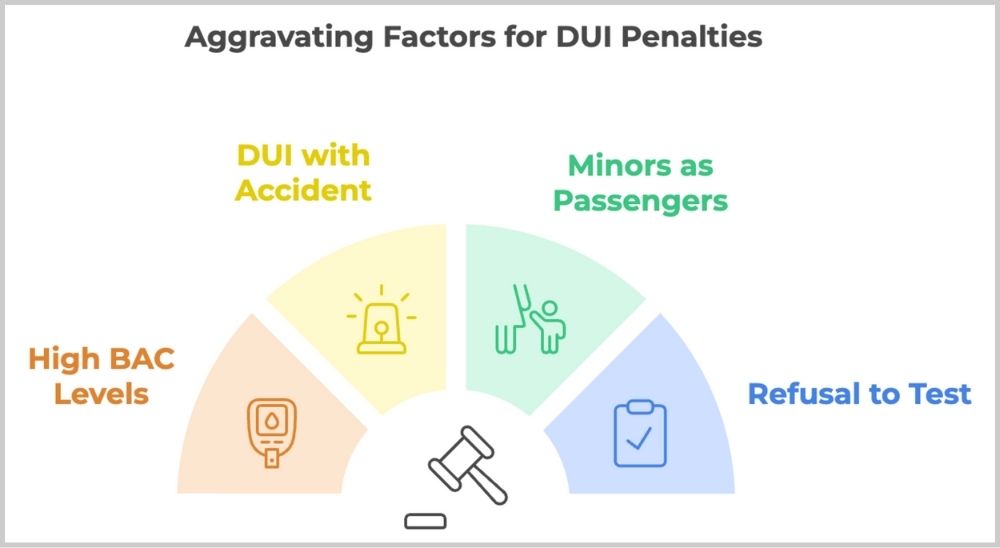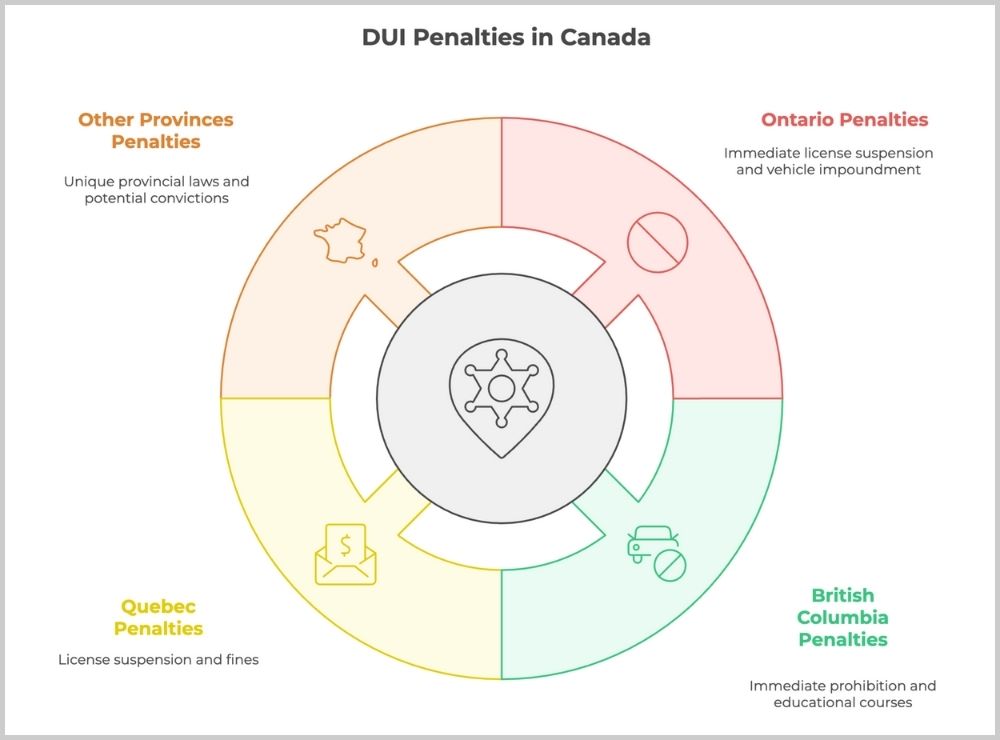What Is The Punishment For DUI In Canada?
Last Updated: November 20, 2024
In Canada, driving under the influence (DUI) or impaired driving is a serious criminal offence that is regulated federally under the Criminal Code. A DUI charge refers to a situation when someone is driving under the influence of alcohol and/or drugs, and they are stopped by the police, who believe that they have reasonable grounds to believe that the person is intoxicated.
Getting a DUI charge is a significant matter – it is a serious offence under Canadian law. There are many consequences to a DUI charge, like fines, license suspension, vehicle seizure and jail time. Further, being convicted of a DUI charge can lead to a permanent criminal record, limited opportunities for future employment, and harm to someone’s personal life.
Types of DUI Offences in Canada
There are a few different ways to get a DUI charge in Canada.
- Alcohol-Impaired Driving
Blood alcohol concentration (BAC) refers to the amount of alcohol in your blood. The police can test your BAC using a device called a breathalyzer that they will ask you to blow into. The Criminal Code indicates that it is illegal to drive with a BAC over 80 milligrams of alcohol per 100 milligrams of blood, or 0.08%. If your BAC is at this level, the police will likely arrest you and charge you under the Criminal Code.
However, even having a BAC between 0.05% and 0.079% can put you at risk of being charged, as this is considered the warning range. Many provinces across Canada have provincial traffic laws that penalize those with BACs under 0.08%. In some provinces, being a novice or commercial driver can even mean that your BAC has to be 0% — meaning that you’re not allowed to have any alcohol in your system while driving.
- Drug-Impaired Driving
In October 2018, cannabis became legal in all provinces for adults over the age of 18. This made the use of marijuana more widespread. After alcohol, cannabis is the most commonly detected substance among those arrested for impaired driving. The primary psychoactive in cannabis is THC, which is what the police will test for when they pull you over. Having a THC level of between 2 and 5 nanograms could lead to a criminal charge.
The police can use Field Sobriety Tests, Drug Recognition Evaluations, an oral fluid drug screener, or even collect a blood sample to test you for drugs.
Impaired driving can include the use of other substances as well, such as opioids, amphetamines, benzodiazepines, and many more. It can include prescription or non-prescription drugs.
- Refusal to Provide a Breath or Blood Sample
Many people are unaware that refusing to provide a breath or blood sample when asked to do so by the police is a criminal offence, covered under s 320.15(1) of the Criminal Code. The penalties for this can be similar to being charged with a DUI – heavy fines and jail time.

Penalties for a DUI Conviction in Canada
There are many different penalties you could face when charged with a DUI, and they are usually dependent on how many times you’ve gotten one before.
DUIs can be costly – even for a first-time offender. You could be facing a mandatory minimum fine of $1,000 and a license suspension for a minimum of one year. You may also have to partake in mandatory educational or rehabilitative programs. These programs can take days to complete, and you will likely have to pay for them.
A second DUI offence could lead to a minimum of 30 days of jail time, license suspension for two years and required participation in the ignition interlock program.
The ignition interlock program entails having an ignition interlock device in your car. This device measures your BAC and prevents your vehicle from being started if your BAC is over a certain level.
For a third DUI offence (or subsequent offences), you could be facing a minimum of 120 days in prison, a license suspension of 3 or more years, or even a permanent license cancellation. You could also be required to have the ignition interlock device in your car for a much longer period.
Aggravating Factors That Increase DUI Penalties

The consequences of a DUI conviction in Canada can be made worse by a variety of different factors. Some of those include:
- High BAC levels (0.16% and above):
If you are caught driving with a BAC of over 0.16% (twice the limit in the Criminal Code), you will likely face higher fines and longer license suspension periods.
- DUI involving an accident or injury
If you caused an accident or harm to someone else as a result of intoxicated driving, you will likely be seeking to convict you for additional charges, which could have longer jail times. You can also face larger fines.
- Driving with passengers under the age of 16
Getting a DUI while you’re driving with passengers under the age of 16 can also lead to aggravated charges.
- Refusal to provide a breath sample
Refusing to provide a breath sample when asked by law enforcement can also lead to higher fines and longer suspension periods. Sometimes, the consequences for this can be almost the same as a typical DUI charge!
Provincial Variations in DUI Penalties
- Ontario
Ontario has administrative driver’s licence suspension, which is when the police can immediately suspend your license at a roadside stop or police station if your BAC is higher than 0.008%, you fail to provide a breath sample or refuse to perform a physical coordination test. Your vehicle could also be impounded for these reasons, regardless of whether or not it is yours. You will also have to pay for the towing and storage costs.
- British Columbia
BC has the Immediate Roadside Prohibition (IRP) Program, which applies administrative penalties. Based on your BAC, you could receive an immediate prohibition from operating a motor vehicle, a vehicle impoundment (and associated costs), fines, a requirement to complete educational courses, and the requirement to use an ignition interlock device.
- Quebec
If facing DUI charges in Quebec, you could be subjected to immediate licence suspension upon arrest, immediate vehicle seizure and impoundment, fines, and a requirement to participate in educational courses.
- Other Provinces
While the Criminal Code has impaired driving laws that apply to all of Canada, provinces have unique penalties. For instance, many provinces, like Winnipeg, choose to convict even those under the legal limit of 0.08%. Being in the 0.05-0.79% range is enough to get a criminal conviction!

Long-Term Consequences of a DUI Conviction in Canada
The consequences of a DUI conviction
- Criminal Records
Criminal records are permanent. They can impact your future employment opportunities, your ability to own a house, and your access to professional licences.
- Increased Insurance Rates
Getting a DUI can impact you financially in the long run. If your insurance company deems you to be a high-risk driver, your premium can increase significantly for an extended period.
- Impact on Travel
If you have a DUI charge or even a pending investigation in some cases, you may be subjected to travel restrictions, even for trips to the United States.
- Loss of Driving Privileges
Driving is an essential part of life. Without it, completing day-to-day tasks can become incredibly challenging. DUI punishment laws in Canada can lead to your license being suspended or your vehicle being taken away from you, ceasing your ability to drive.
Possible Defences Against a DUI Charge in Canada
While getting a DUI can be a stressful and hopeless situation, remember that there are defences that may be available to you. Situations like this are not always black and white, and there could very well be room for valuable debate that could highlight various inconsistencies and holes within the police and prosecution’s investigation against you.
- Challenging the legality of the traffic stop
There are constitutional issues that can be raised in DUI cases in Canada. We have the Charter to protect us from the unconstitutional actions of the police. If your Charter rights are violated at any point during the investigation, it can be raised in court as a defence.
For instance, if the police pull you over for no reason, they have violated your Charter rights to protection from unreasonable search and seizure and arbitrary detention. They need reasonable grounds to stop you on the road, and if they fail to prove that they had any, your charges could be dropped.
- Questioning the Accuracy of the BAC Tests
Sometimes, the devices used by police to determine BAC (breathalyzers) are not working properly. These devices need to be calibrated regularly and have other required maintenance as well.
Further, while these devices can be effective, they can also be wrong. There could be technician errors, where the police officer doesn’t use the device correctly, or technical errors with the device. Certain medications, residual alcohol in the mouth, and even environmental factors can impact the accuracy of results.
- Raising reasonable doubt about the officer observations
Police officers can only pull you over if they have reasonable grounds to believe you have committed a crime. For instance, if they can see clearly on their speed-o-meter that you are above the maximum limit, they can stop you.
However, there are times when police officers do not have reasonable grounds to believe someone has committed a crime, and they still pull them over and subsequently discover evidence that could point to an offence. Or the observations they based their decision on could not considered “reasonable grounds”. In cases like these, it is important to evaluate what basis the officer initiated their investigation.
How a DUI Lawyer Can Help
There are many things a DUI lawyer can do to help you in facing a DUI charge. They can assess the evidence against you by reviewing test results, police reports, and witness statements. They can challenge the admissibility of this evidence if need be.
Further, they can analyze the specific circumstances of your case in order to craft an effective defence strategy for you. Traffic provisions and the Criminal Code can be difficult to understand, but a DUI defence lawyer can help you navigate these complexities.
DUI lawyers can also help by advocating on your behalf for a lesser sentence or alternative sentencing options. These are solutions that can keep you away from prison and perhaps even reduce the number of fines you have to pay.
Conclusion
DUI punishment laws in Canada are serious. They can include heavy fines, vehicle seizure and impoundment, license suspensions, and even jail time. Beyond these consequences, DUIs can also leave a lasting impact on your life – in the form of a permanent criminal record.
Getting a DUI is a tough situation to be in. However, having a knowledgeable and experienced DUI lawyer can change the course of your case drastically. It is important that you reach out to our DUI lawyers today if you are facing DUI charges to get the legal assistance you need.
Get A Free Consultation
"*" indicates required fields



